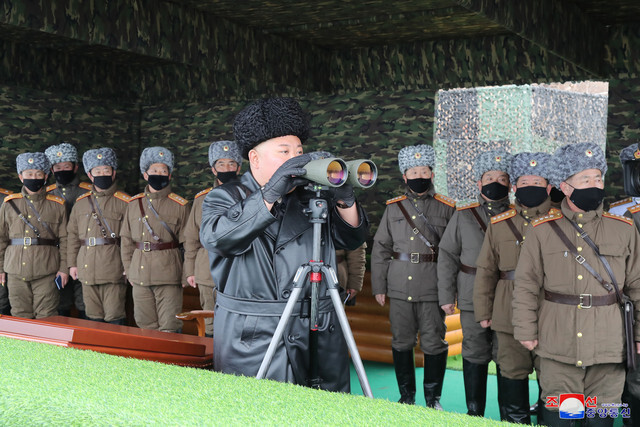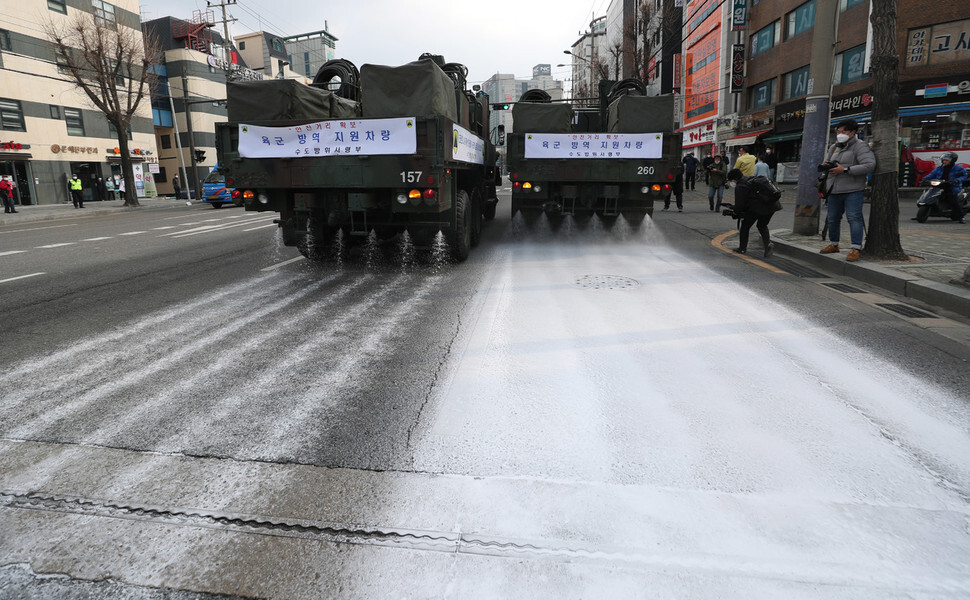hankyoreh
Links to other country sites 다른 나라 사이트 링크
[News analysis] The need for a cooperative network across Northeast Asia to fight the coronavirus

The exchange of letters between South Korean President Moon Jae-in and North Korean leader Kim Jong-un over the novel coronavirus situation is raising hopes for the possibility of inter-Korean cooperation in the area of public health. Some are even envisioning that once the specifics of this inter-Korean cooperation are worked out, it could be developed into a Northeast Asian public health cooperation system where South and North Korea, China, and Japan work together on quarantining and disease prevention. Perceptions of security are also shifting, and a new concept of security is gaining strength -- one that goes beyond the conventional ideas of security and their focus on the North Korean military threat to encompass areas such as infectious disease.
Since the letter exchange, the South Korean government has been cautious about mentioning the possibility of follow-up measures such as inter-Korean public health cooperation. At a regular briefing on Mar. 6, Cho Hye-sil, a deputy spokesperson for the Ministry of Unification (MOU), said, “Rather than talking about developing different follow-up measures, we’re planning to make a decision while taking into account the general conditions, including the situation with the coronavirus and the political situation on the Korean Peninsula.” North Korea has reportedly not yet replied to an announcement by private North Korean aid groups early last month that they intend to cooperate on coronavirus prevention.
With all of South Korea currently battling the coronavirus, inter-Korean public health cooperation appears unlikely for the time being. Given all the controversy that erupted after masks were provided to China, we will not be in a position any time soon where we can easily send medical goods like masks, diagnosis kits, or mobile negative pressure units to North Korea. The government has had its hands full recently debunking fake news claiming that it has “sent masks to North Korea.”
To prevent the coronavirus from spreading, North Korea has closed its borders and declared a national state of emergency, which it is committing its full efforts to addressing. Officially, it has yet to announce any cases of people infected with the coronavirus, but it is impossible to know the true situation.
Experts divided on actual coronavirus situation in N. KoreaExperts have been divided in their analysis. It may actually be that no one in North Korea has yet been infected. According to experts, the swift sealing of borders, the nature of the socialist medical system and its emphasis on preventive medicine, and the North Korean social structure allowing for easy control over movement between regions all work in favor of disease control and prevention. There has also been quite a bit of speculation that infections have already occurred there. According to this view, the heavy reliance of the North Korean economy on China makes it difficult to close the two sides’ border completely, while the shortage of testing equipment and diagnosis kits means North Korea is ill-equipped to perform proper coronavirus testing.
The coronavirus outbreak is dealing a severe blow to the North Korean economy, which is heavily dependent on China. The closing of the Chinese and Russian borders is also a major obstacle to the North Korea-China and North Korea-Russia cooperation that are central to the “new path” declared by Pyongyang. North Korea has declared the coronavirus to be a “life-or-death political issue for the state.” It is a response that cannot simply be dismissed as the result of the poor condition of North Korea’s public health and medical system.
In a message posted on the website of the Washington-based group Center for American Progress on Mar. 6 by senior fellow Michael Fuchs and others, it was predicted that the coronavirus would have a major impact on tensions in Asia, diplomacy and military readiness postures, and the stability of individual governments. Confusion in the coronavirus responses of South Korea, China, and Japan has recently been dealing blows to the leadership of Presidents Moon Jae-in and Xi Jinping and Prime Minister Shinzo Abe.
The coronavirus outbreak has resulted in infectious disease rapidly emerging as a real security threat. Some 8,270 people have recently been placed under independent quarantine by the South Korean military. A number of troops nearly equivalent in scale to an army division has been sidelined. The response from US Forces Korea has been at the level of sealing off bases. In an emergency meeting of major commanders on Feb. 28, Minister of National Defense Jeong Kyeong-doo gave directions to “view the current situation as equivalent to a wartime situation and commit all available resources to it.” All field exercises have been suspended since Feb. 24, and South Korea-US joint drills that were scheduled to begin this month have been effectively called off.
The international community has been calling for countermeasures to what it has been described as “new security threats” such as infectious disease and climate change. The concept of the “new security threat” was created to distinguish it from the traditional security concept of military threats.
In response to the emergence of new infectious diseases like the H1N1 influenza virus, SARS (severe acute respiratory syndrome), and MERS (Middle East respiratory syndrome) has led the US and other countries to recognize infectious diseases not simply as a matter of public health, but as new threats to security. The term “health security” -- which combines “public health” with “national security” -- has recently emerged.
When the Ebola outbreak occurred in 2014, the US operated a global health security unit as a permanent organization within the White House National Security Council. In December 2014, the international community put together a global cooperation system known as the Global Health Security Agenda (GHSA) based on the shared recognition of new infectious diseases such as SARS and Ebola as matters with direct bearing on individual countries’ safety and security issues. Twenty-eight countries took part under US leadership, along global public health institutions such as the World Health Organization (WHO), Food and Agriculture Organization (FAO), and World Organisation for Animal Health (OIE).
Traditional security and new security differ considerably in their concepts and response approaches. Traditional security is rooted in structures of confrontation and conflict, where an outside threat is regarded as “the enemy.” Traditional security is a matter of establishing a robust readiness posture within a country to confront a military threat that is being posed from outside its borders.

New security threats, in contrast, cross over borders. As the coronavirus outbreak has shown, viruses do not conform to divisions of nationality or national borders. The response to new security threats must start from a structure of cooperation and coexistence, which requires different countries to work together.
Experts have proposed the discussion of plans for a joint Northeast Asian infectious disease response at the regional level, with South and North Korea, China, and Japan participating. In a video released on Mar. 2 by the Korea University Medical Center, Kim Sin-gon, an endocrinologist at Korea University Anam Hospital who serves as chair of the Association of Healthcare for Korean Unification (AHKU), suggested that the coronavirus crisis should be taken by South and North Korea as an opportunity for shared benefits and joint risk management. “In a very small environment like the 220,000 square kilometers of the Korean Peninsula, if one half of the population is not healthy, the other half cannot be healthy,” he stressed. “South and North Korea need to put their heads together to develop a system and route for joint threat and disaster management. This is ultimately a matter of saving South and North Korean lives.” Kim also cited the example of a public health agreement established between East and West Germany to create an official system prior to their reunification.
Kwak Tae-hwan, an emeritus professor at Eastern Kentucky University who previously served as director of the Korea Institute for National Unification (KINU), recently published a column in which he suggested that the South Korean government should take the lead in establishing an “international cooperation for Northeast Asian cooperation on the novel coronavirus,” with the participation of the US, China, Japan, and South and North Korea. He also expressed the view that progress could ultimately be achieved in the Korean Peninsula peace and denuclearization processes if relationships of trust can be formed between South and North Korea, North Korea and the US, South Korea and China, and South Korea and Japan through global cooperation on coronavirus prevention.
Kim Jin-hyang, chairman of the Kaesong Industrial District Foundation, recently proposed the production of coronavirus prevention supplies at the Kaesong Industrial Complex. “Countries around the world have been struggling with a lack of masks and protective clothing,” he noted, suggesting that “we could keep up not just with domestic demand but with global demand too by operating mask production companies [around 50] and sewing businesses [64] capable of mass-producing anti-contamination suits at the Kaesong complex.” In light of the global spread of the coronavirus, Kim predicted that the UN Security Council sanctions committee and the rest of the international committee could be persuaded to allow the complex’s use to produce disease prevention items.
By Kwon Hyuk-chul, director of the Hankyoreh Peace Institute
Please direct comments or questions to [english@hani.co.kr]

Editorial・opinion
![[Column] Season 2 of special prosecutor probe may be coming to Korea soon [Column] Season 2 of special prosecutor probe may be coming to Korea soon](https://flexible.img.hani.co.kr/flexible/normal/500/300/imgdb/original/2024/0426/3317141030699447.jpg) [Column] Season 2 of special prosecutor probe may be coming to Korea soon
[Column] Season 2 of special prosecutor probe may be coming to Korea soon![[Column] Park Geun-hye déjà vu in Yoon Suk-yeol [Column] Park Geun-hye déjà vu in Yoon Suk-yeol](https://flexible.img.hani.co.kr/flexible/normal/500/300/imgdb/original/2024/0424/651713945113788.jpg) [Column] Park Geun-hye déjà vu in Yoon Suk-yeol
[Column] Park Geun-hye déjà vu in Yoon Suk-yeol- [Editorial] New weight of N. Korea’s nuclear threats makes dialogue all the more urgent
- [Guest essay] The real reason Korea’s new right wants to dub Rhee a founding father
- [Column] ‘Choson’: Is it time we start referring to N. Korea in its own terms?
- [Editorial] Japan’s rewriting of history with Korea has gone too far
- [Column] The president’s questionable capacity for dialogue
- [Column] Are chaebol firms just pizza pies for families to divvy up as they please?
- [Column] Has Korea, too, crossed the Rubicon on China?
- [Correspondent’s column] In Japan’s alliance with US, echoes of its past alliances with UK
Most viewed articles
- 1‘We must say no’: Seoul defense chief on Korean, USFK involvement in hypothetical Taiwan crisis
- 2Is Japan about to snatch control of Line messenger from Korea’s Naver?
- 3Division commander ordered troops to enter raging flood waters before Marine died, survivor says
- 4[Editorial] Korea’s surprise Q1 growth requires objective assessment, not blind fanfare
- 5[Column] Season 2 of special prosecutor probe may be coming to Korea soon
- 6[Special report- Part III] Curses, verbal abuse, and impossible quotas
- 7Flying “new right” flag, Korea’s Yoon Suk-yeol charges toward ideological rule
- 8[Guest essay] The real reason Korea’s new right wants to dub Rhee a founding father
- 9[Column] ‘Choson’: Is it time we start referring to N. Korea in its own terms?
- 10[Column] Park Geun-hye déjà vu in Yoon Suk-yeol